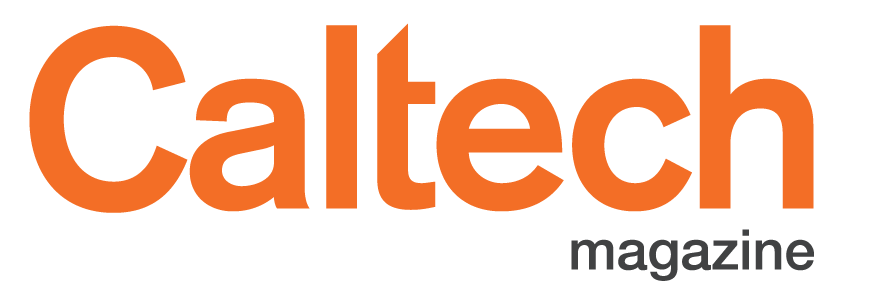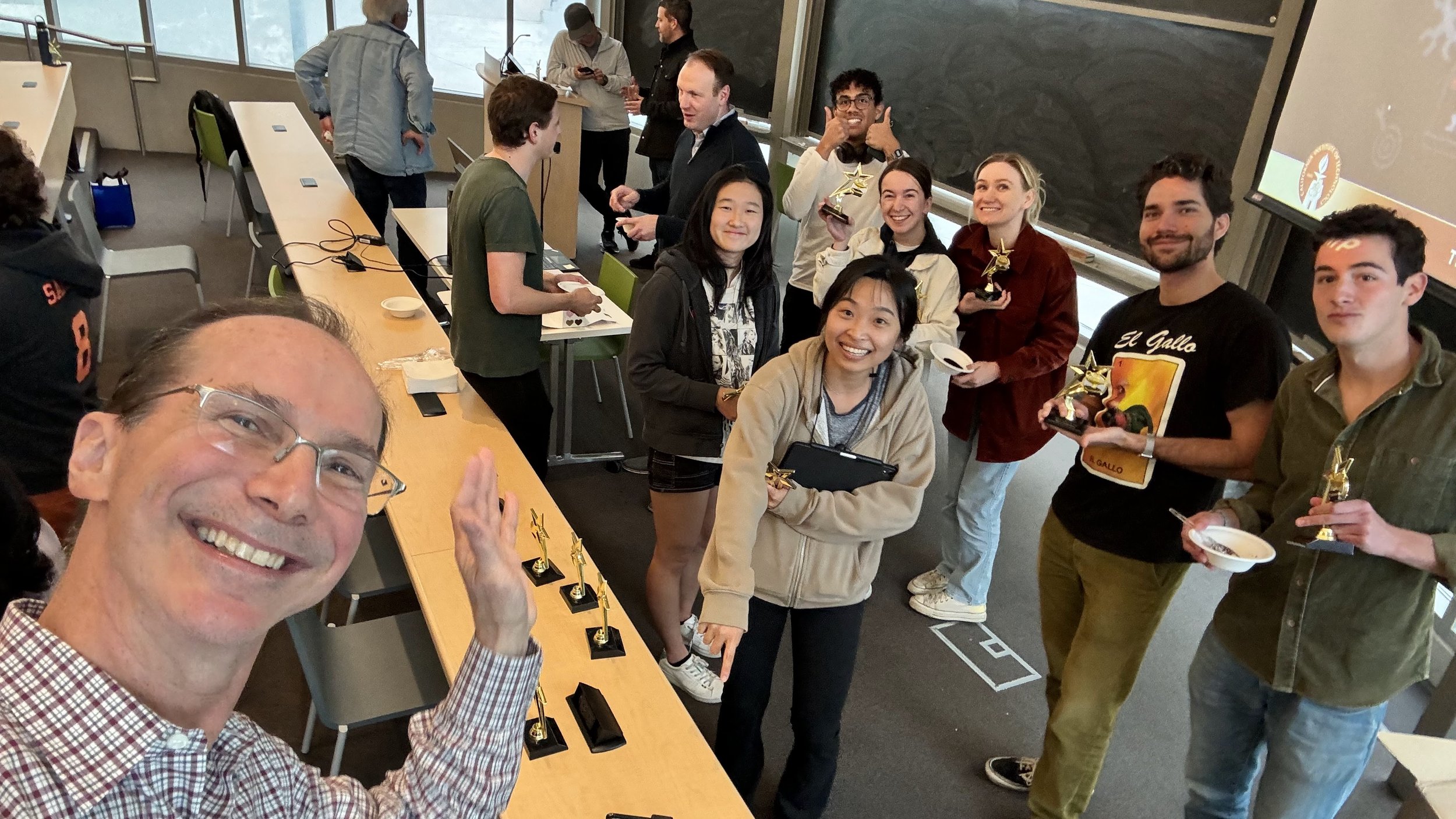New Class Teaches Caltech Students Start-Up Skills
Bill Gross and Caltech students.
By ANDREW MOSEMAN
Bill Gross’s Caltech students had a problem familiar to millions: They could not get Taylor Swift tickets. A limited number are available for every concert, and AI-aided scalpers gobble up tickets to resell them for top dollar before many fans have a chance to buy.
Three students in E/SEC 102, Science and Technology Entrepreneurship, had an idea: What if a system could tell the difference between a real “Swiftie” and someone just looking to make a buck? “That’s actually led to a really interesting business plan called ‘TrueFan,’” Gross says, “which is a system for rewarding the people who actually have grown up with Taylor Swift, who have bought her albums, who have bought her merchandise, who actually care about her, who have actually demonstrated fandom in a way that a scalper algorithm wouldn’t.”
The way it would work, according to Eva Kercmar, a second-year graduate student in chemistry, is that app users could link their music platform and social media accounts as well as register purchased merchandise and upload QR codes for past attended concerts.
“Each activity would bring you certain amount of points, and that would bring you to a certain tier,” Kercmar says. “The higher the tier, the more likely you are to get the ticket for the show.”
Caltech students from Bill Gross’ class.
TrueFan is just one of many clever start-up ideas to come out of the new course, which debuted in the fall 2023 term under the guidance of Gross (BS ’81), a longtime entrepreneur, startup evangelist, and Caltech trustee. After starting several of his own companies in high school and college, Gross founded the Pasadena-based start-up Idealab in 1996. This year, he brought his lessons from years of entrepreneurial experience back to campus.
“I was thinking about whether I could both give a prize for entrepreneurship and also teach some of the fundamentals of entrepreneurship,” says Gross, who recently established the Bill Gross Prize for Entrepreneurship to help students get their business plans up and running. “I’m not thinking that everybody should become an entrepreneur, but it’s a great thing to expose people to so at least they can understand if they want to make that be an option for themselves.”
Kercmar says the class has inspired her to potentially move forward with her business idea in the future.
“Professor Gross has taught us amazing things that one should definitely know before creating their own business, from generating the idea and brainstorming to asking for funding, creating a team for your business, and registering patents,” she says. “His lectures are not just some things taken from books and the Internet but from Professor Gross's personal experience, which makes his advice so much more valuable.”
At Idealab, Gross developed his 25 lessons learned from 25 years of starting companies, which he made into a series of YouTube lectures. He streamlined that hard-earned wisdom into a course curriculum that spanned 20 classes. Some of those classes covered standard knowledge and practical skills any startup founder must master, including how to protect intellectual property, iterate on an idea, and match the right idea to the right marketplace. Others covered underrated abilities that could change the course of an entrepreneur’s life, such as the ability to tell one’s own story. Successful entrepreneurs are pitching themselves and their passion, he says, not merely giving a business presentation.
Bill Gross.
“I remember from my own time at Caltech, there was a class called E 10 at the time,” Gross says. “It was engineering presentations and public speaking. I had never spoken in public before. It was terrifying for me, but it was very valuable for me. This experience of taking an idea of yours, clarifying it down so it’s simple and understandable, and communicating it to someone else—that’s a valuable skill independent of whether you ever plan to start a business.”
Throughout his course, Gross challenged his students to come up with the kind of spark that could lead to a real start-up. Once each student had five to 10 nascent ideas, he helped them to focus on just one by finding out what they were truly passionate about—passionate enough to spend years working on a great idea.
The Taylor Swift TrueFan idea was born of this process, and so were a variety of other ideas. One was a kind of electrostatic coating on solar panels that would make them dust resistant, because panels not covered in dust generate more clean energy. Another, called “Nutrilog,” would use AI and computer vision to log everything a person eats and use that data to determine the culprit when something in that person’s diet is causing a health problem.
“I have irritable bowel syndrome, so I was inspired by my own experiences to build an app that would help me and other people like me with IBS manage our day-to-day better,” explains Nikhila Swarna, a third-year PhD student in biochemistry and molecular biophysics. “The process of isolating a trigger food usually requires a lot of iteration and our team’s hope is that through this app we would be able to automate that process. Bill fostered a supportive, fun, and creative environment in class that really motivated us and made us realize that entrepreneurship is a lot more accessible than we thought!”
Gross is investing more than his time in these student entrepreneurs. After the class, they were encouraged to enter his entrepreneurship competition to win up to $25,000. The contest, open to all students, closes in early January, after which finalists will be chosen for a spring mentorship program. At the end of the academic year, those students will participate in a business plan pitch-off, and six teams will receive startup money. “I was really hoping that I could help people shape and form ideas and even select ideas, and that's been going very, very well,” says Gross. “I wildly admire the students and their capabilities.”



